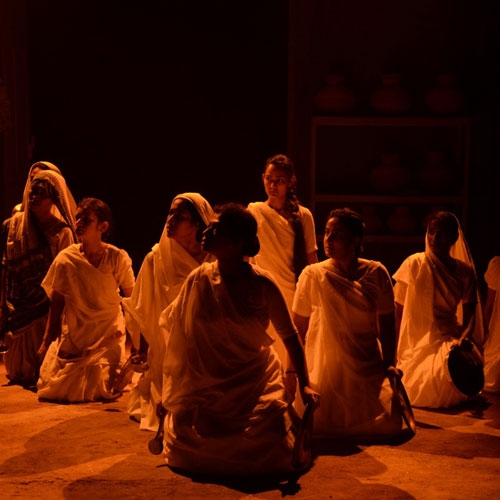

Event Info
- Language: Hindi & Bundeli
- City / State: Jabalpur, Madhya Pradesh
- Directed By: Swati Dubey
- Produced By: Samagam Rangmandal
Agarbatti
Hindi & Bundeli
A riveting tale of caste, gender, class, conflict and politics, Agarbatti is based on the Behmai massacre committed by Bandit Queen Phoolan Devi and her gang to avenge her gangrape by the upper-caste Thakur men of Behmai.
A riveting tale of caste, gender, class, conflict and politics, Agarbatti is based on the Behmai massacre committed by Bandit Queen Phoolan Devi and her gang to avenge her gangrape by the upper-caste Thakur men of Behmai. In order to rehabilitate the widows of the massacred Thakurs, the government opens an incense stick factory in the village. One of the widows, Lala Ram Thakurain, reserves the last rites of her husband until Phoolan Devi has been executed. The story begins after Phoolan’s death and explores its implications and consequences on a series and spectrum of events.
CAST
Rukmini Sircar
Lala Ram Thakurain
Monika Panwar
Damyanti
Pallavi Jadhao
Lajjo
Pooja Gupta
Parbati
Swati Dubey
Suman
Jyotsna Kataria
Koushalya
Jina Baishya
Kalli
Goge Bam
Nanhi Bai
Gagan Shrivastav
Heera
Bhupendra Singh Jadawat
Sohan Singh
Arpit Singh
Surjan Thakur
Utsav Hande
Raghu Thakur
Shivakar Sapre
Shivpal Lala
Harshit Singh
Lala Thakur
Rachna Gupta
Ram Kali
Snehlata Tagde
Sukkan Bai
CREW
Ashish Pathak
Playwright
Swati Dubey
Design and Direction
Light Design, Set Design and Music Director
Govind Namdev
Voice
Babi Baruah
Playback
Shivam Bawaria
Music Operation
This is not just a play for me, but a relationship. Initially, I thought about the contemporary value of this play and came to the conclusion that it raises a serious question on humanity, and if caste, class and gender differences still exist in the 21st century. This play has a discourse which reaches a point that created a turbulence for me during the process of the play. I consider this play an extension of the classic film Bandit Queen; although the issues raised by this play go beyond it. It was painful to go through Phoolan’s life, character and Behmai as an event but it was even more painful to perform this play since it took us to a place where we felt ashamed as human beings.